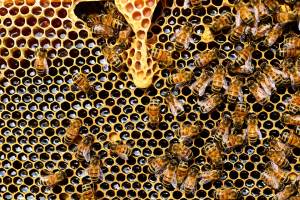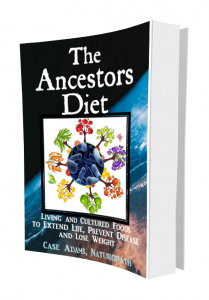Royal Jelly Boosts Testosterone, Estrogen, Reduces Menopause

Royal jelly increases testosterone in men and estrogen in women.
Royal jelly is a natural compound produced by bees. Clinical research has now confirmed that royal jelly boosts testosterone in men, increases estrogen in menopausal women, and reduces many symptoms of menopause.
In this article
What is royal jelly?
In a nutshell, royal jelly is a substance that worker bees in a hive will secrete and feed to the Queen bee. This substance is also fed to the infant bees (larvae) that may turn out to be queens.
This sticky fluid is collected in a separate part of the hive, and thus can be harvested separately by beekeepers.
It contains a variety of nutrients, including proteins, B vitamins, trace minerals and special fats called sterols. It also contains antibiotic and antibacterial compounds. We’ll discuss some of its more special compounds further below.
Royal jelly has been used for centuries in many traditional medicines around the world for various purposes. These have included issues related to inflammation, fatigue, fertility and respiratory conditions. Here we will focus on the use of royal jelly for menopause in women as well as boosting testosterone levels in men.
Estrogen and menopause symptoms
During her forties, a woman’s body will decrease the production of estrogen. This occurs as the body stops producing eggs, accompanied by the ending of menstruation.
As a result, women often experience a variety of menopause symptoms between the mid-forties and the mid-fifties, due to this decrease in available estrogen.
This reduction in available estrogen has negative affects upon the nervous system. This in turn produces a variety of menopause symptoms. These include insomnia, headaches, hot flashes, fatigue, anxiety, irritability, stiffness and various aches and pains.
The category of aches and pains are not to be overlooked. Stiffness and pain in the back, neck, joints and muscles can all be a result of this drop in estrogen levels.
This doesn’t mean there is no hope. Nature provides a number of foods and herbs that have been shown to boost estrogen levels naturally.
Now we can add to these the use of royal jelly to significantly yet safely boost estrogen levels.
Royal jelly reduces symptoms of menopause
In a 2018 clinical study from Japan’s Kindai University, medical researchers conducted a clinical study on 42 menopausal women.
The women were otherwise healthy, and not on any estrogen medications. They were each tested for their menopausal symptoms. Then they were split into two groups.
One group was given a placebo. The other group was given 800 milligrams of royal jelly per day (from the Yamada Bee Company). The supplementation lasted a total of 12 weeks.
After four weeks, the women were tested again for menopausal symptoms. They were tested again after another eight weeks. Then they were tested once again 4 weeks after the royal jelly supplementation ended.
The researchers found that even after four weeks, the women taking the royal jelly had significant reductions in a number of menopausal symptoms. Hot flashes scores decreased by 13 points (versus 4.5 for the placebo group), sweating scores were reduced by 15.4 (versus 7.5), light sleep was reduced by 13 points (versus 7), irritability score was reduced by 15.5 (versus 2.3), anxiety was reduced by 15 (versus 1.1), anxious trifles by 14 (versus 7), depressive moods scores were reduced by 17 points (versus 3.5), fatigue went down 19 (versus 14), forgetfulness went down by 12 (versus 7), dizziness went down by 18 (versus 8), headaches went down by 8.6 (versus 4), neck stiffness went down by 6 (versus 4), backaches by 8 (versus 3.6), joint pain went down by 11.7 (versus 8.2), and cold hands and feet by 19.6 (versus 9.2).
These sorts of improvements in menopause symptoms continued and increased through the twelve weeks of treatment with royal jelly. Score reductions in the teens increased to the 20s and in some cases, 30s. For example, fatigue scores went down by 31 points. Hot flashes went down by 25 points and sweating went down by 29.5 points.
While the differences between the royal jelly treatment and placebo groups varied (but were still higher), some were significantly higher than the placebo groups. Anxiety scores and backache scores were starkly better than the placebo groups. The researchers added that these symptoms were particularly significant among Japanese women, so the results were critically important.
Then four weeks after the treatment ended, the researchers again tested the women. They found a continued reduction in most of these menopausal symptoms. While the differences between the placebo groups were not as great as four weeks after the royal jelly supplementation, it is obvious that royal jelly effects have some staying power.
Other studies confirm estrogen findings
This study was not a fluke. Other research has showed that royal jelly has estrogenic effects.
A 2014 study tested 110 medical students with premenstrual syndrome. They were given a placebo or royal jelly in capsules for two months. Their PMS scores decreased from 23.17 to 11.42 during the two months.
This compared to little change among the placebo group.
A 2014 study tested 50 women with type-2 diabetes. They were given either 1,000 milligrams of royal jelly or a placebo for two months. The researchers found the royal jelly increased insulin levels and reduced other diabetes markers. Higher estrogen levels have been associated with increased insulin and better blood sugar markers.
A 2016 study from Japan’s Kumamoto University studied royal jelly in the laboratory.
The researchers tested royal jelly with human cells. They found that royal jelly boosted estrogen by binding to estrogen receptors. They also found similar effects with animals. They also found that royal jelly increased the uterus wall thickness.
A 2006 study from Japan’s Kumamoto University studied royal jelly in human cells and found the same effects. They also found similar results with the uterus.
Other studies have investigated royal jelly among aging female mice with similar findings. Reductions in menopausal symptoms were evident in all these studies, just as they were in the human studies above.
Royal jelly boosts testosterone levels
A 2012 study from Japan’s Gifu University tested 61 men and women between 42 and 83 years old. They were divided into two groups. One group was given 3,000 milligrams of royal jelly per day in liquid form. The other group was given a placebo.
The volunteers were tested prior to and after six months of the supplementation period. The researchers found that among the men, testosterone levels increased significantly.
They also found that red blood cell counts were increased and DHEA-S levels were lower among the men. That means the royal jelly was effective in assisting the conversion of testosterone from DHEA-S.
Having too much DHEA-S and too little conversion to testosterone is one of the hallmark mechanisms seen in prostate enlargement among men.
A 2014 study on mice confirmed that royal jelly boosts testosterone levels, as well as sperm counts and motility.
How does royal jelly work?
Royal jelly contains a number of special fats that are called sterols. These fats work to alter the body’s hormone activities.
Some of research above found four estrogenic compounds from royal jelly. These are:
• 10-hydroxydecanoic acid
• 10-hydroxy-trans-2-decenoic acid
• trans-2-decenoic acid
• 24-methylenecholesterol
These four compounds from royal jelly have been tested independently. Each was found to bind to the beta estrogen receptor. When this binding occurs, this allows for more circulating estrogen to work elsewhere in the body.
The royal jelly compounds do not appear to attach to the alpha estrogen receptor. This qualifies royal jelly as a “weak estrogenic compound.”
Note that being a “weak” estrogenic compound is not a bad thing. It is actually a good thing, because it doesn’t produce side effects that are common with taking synthetic estrogen. These include potential cardiovascular problems and a higher risk of breast cancer according to some research.
Furthermore, the royal jelly compounds work subtly within the body to modulate gene expression that helps reduce the amount of estrogen needed for many of the tissue activities. This is one reason why the uterine wall thickness was increased.
This also can explain the reduction in fatigue, anxiety and the aches and pains associated with menopause.
Part of a natural action plan
Royal jelly should not be considered a single bullet solution to all menopause issues. In this website we have discussed a number of other natural strategies to reduce menopause symptoms. These are included dietary strategies along with certain herbs and foods. Here is a summary of some of this research:
Other strategies for menopause:
• Red clover helps with menopause symptoms
• Fenugreek boosts estrogen
• Hops herb fights menopause symptoms
• Soy isoflavones and equol production
• Grape seed extract helps ease menopause
• Pine bark extract helps with menopause
• Dried plums help prevent bone loss in menopause
• Labisia herb helps with menopause
For boosting men’s testosterone levels:
• Red ginseng boosts testosterone
• Ashwaganda hikes testosterone and muscle strength
• Reishi and Codyceps mushrooms increase testosterone
REFERENCES:
Takashi Asama, Hidenori Matsuzaki, Shinobu Fukushima, Tomoki Tatefuji, Ken Hashimoto, and Takashi Takeda. Royal Jelly Supplementation Improves Menopausal Symptoms Such as Backache, Low Back Pain, and Anxiety in Postmenopausal Japanese Women. Evidence-Based Complementary and Alternative Medicine, vol. 2018, Article ID 4868412, 7 pages, 2018. https://doi.org/10.1155/2018/4868412.
Kazu-Michi Suzuki, Yoichiro Isohama, Hiroe Maruyama, et al. Estrogenic Activities of Royal Jelly. Evidence-Based Complementary and Alternative Medicine, vol. 5, no. 3, pp. 295-302, 2008. https://doi.org/10.1093/ecam/nem036.
https://www.hindawi.com/journals/ecam/2008/938757/abs/
Pourmoradian, S., Mahdavi, R., Mobasseri, M. et al. Effects of royal jelly supplementation on glycemic control and oxidative stress factors in type 2 diabetic female: A randomized clinical trial. Chin. J. Integr. Med. (2014) 20: 347. https://doi.org/10.1007/s11655-014-1804-8
Taavoni S, Barkhordari F, Goushegir A, Haghani H. Effect of Royal Jelly on premenstrual syndrome among Iranian medical sciences students: a randomized, triple-blind, placebo-controlled study. Complement Ther Med. 2014 Aug;22(4):601-6.
Moutsatsou P, Papoutsi Z, Kassi E, Heldring N, Zhao C, Tsiapara A, Melliou E, Chrousos GP, Chinou I, Karshikoff A, Nilsson L, Dahlman-Wright K. Fatty acids derived from royal jelly are modulators of estrogen receptor functions. PLoS One. 2010 Dec 22;5(12):e15594. doi: 10.1371/journal.pone.0015594.
Mishima S, Suzuki KM, Isohama Y, Kuratsu N, Araki Y, Inoue M, Miyata T. Royal jelly has estrogenic effects in vitro and in vivo. J Ethnopharmacol. 2005 Oct 3;101(1-3):215-20.
Morita H, Ikeda T, Kajita K, Fujioka K, Mori I, Okada H, Uno Y, Ishizuka T. Effect of royal jelly ingestion for six months on healthy volunteers. Nutr J. 2012 Sep 21;11:77. doi: 10.1186/1475-2891-11-77.
Zahmatkesh E, Najafi G, Nejati V, Heidari R. Protective effect of royal jelly on the sperm parameters and testosterone level and lipid peroxidation in adult mice treated with oxymetholone. Avicenna J Phytomed. 2014 Jan;4(1):43-52.















